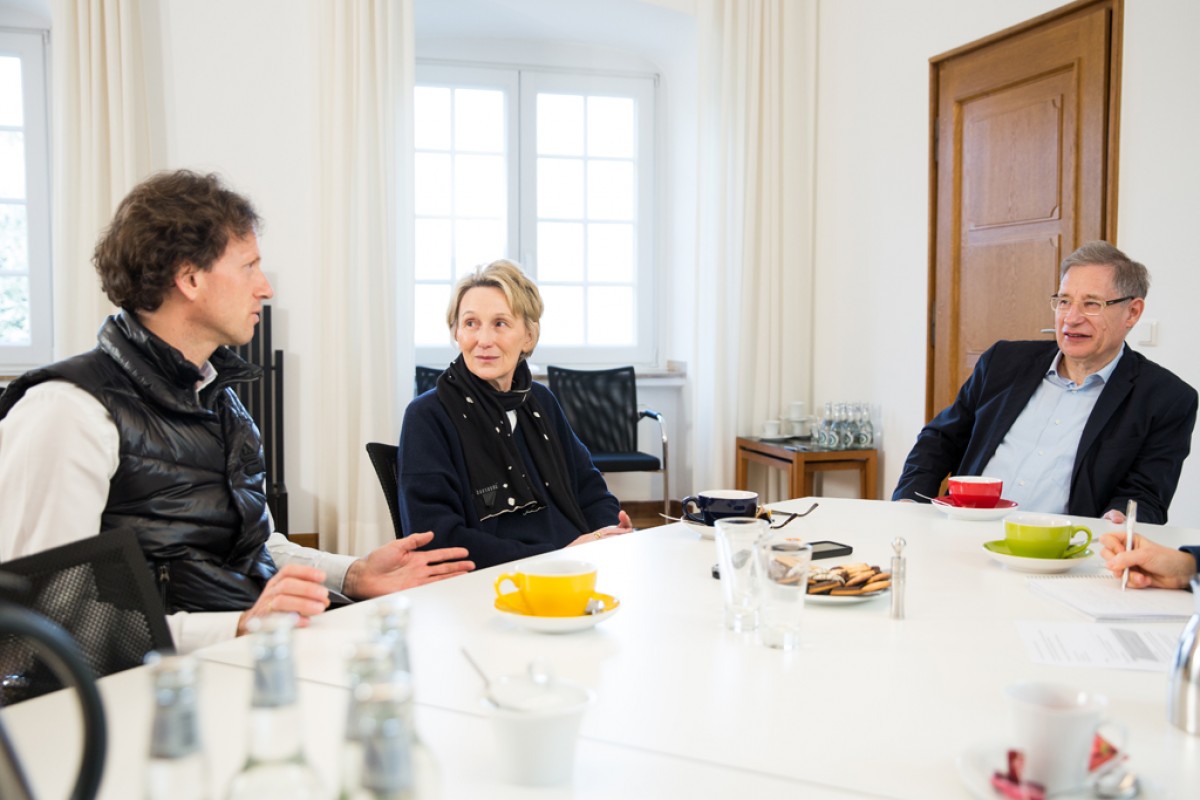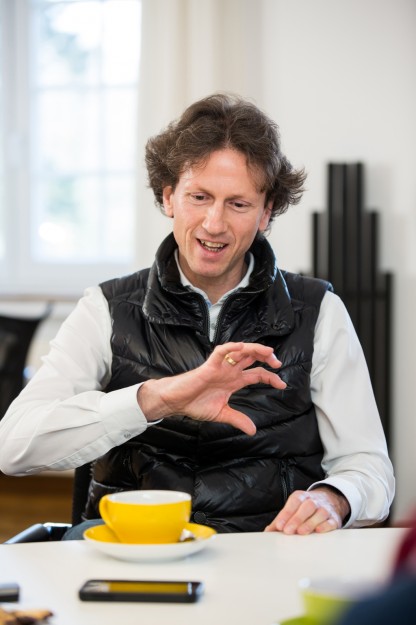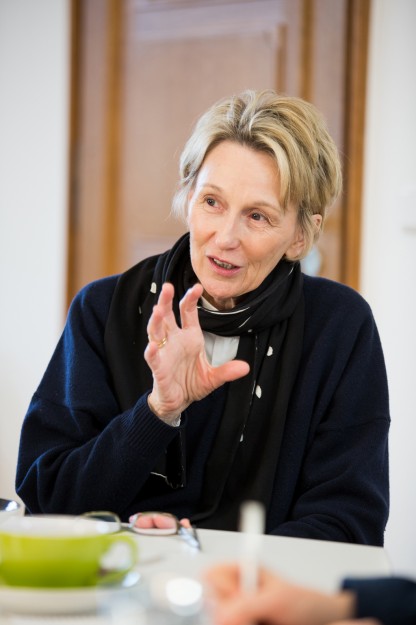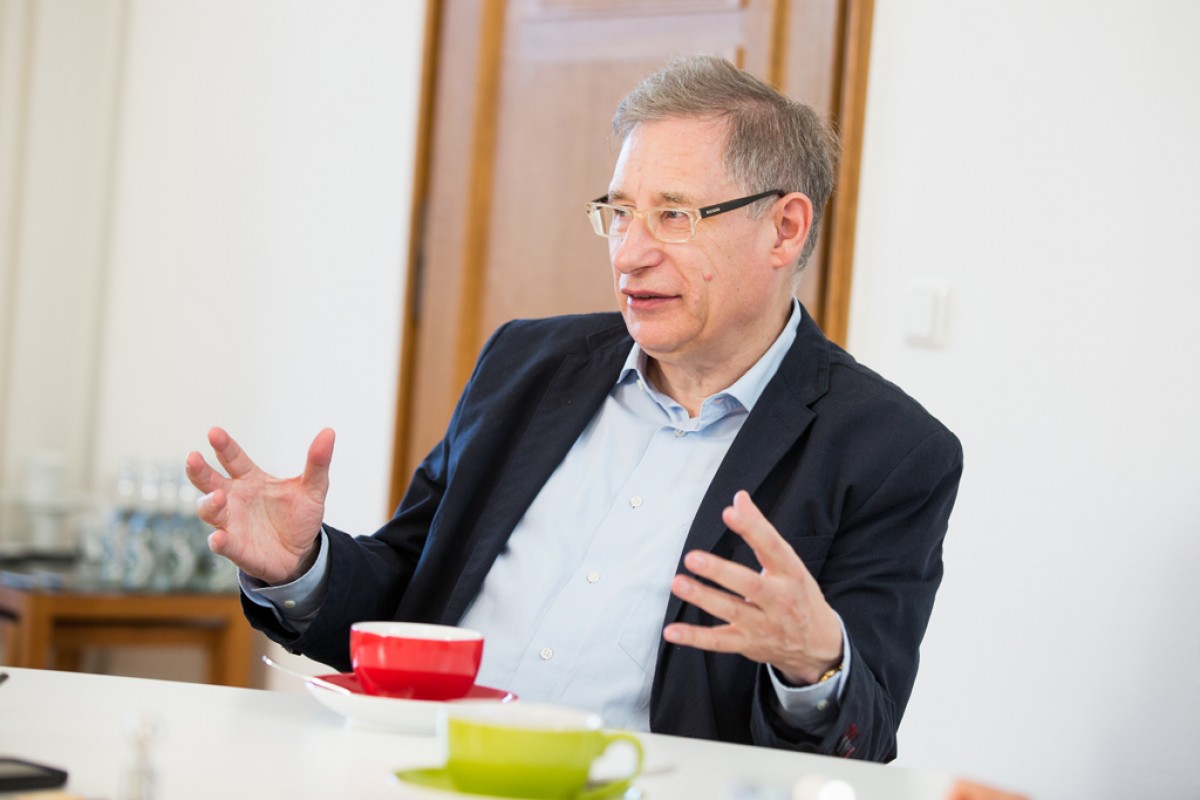
An interview with the project representatives of the three Cluster of Excellence proposals
The first step has been taken – three Cluster of Excellence proposals have been officially submitted by their respective representatives. Now comes the assessment, and on 27 September, the final decision. The content of the proposals is obviously confidential. Nonetheless, WWU press officer Kathrin Kottke spoke with the representatives of the three planned clusters, Prof. Dr. Lydia Sorokin, Prof. Dr. Detlef Pollack and Prof. Dr. Mario Ohlberger, about the joys and ordeals of the writing process and about the challenge of keeping an overview.
After weeks and months of intensively working on these proposals, you must have felt relieved the day you handed them in. Did you break open the champagne?
Sorokin: Unfortunately, we had no time to celebrate. On the day of submission, we were completely exhausted, but we had to immediately start preparing for the presentation to the reviewer panel, scheduled for the end of April.
Ohlberger: Things got hectic right before we handed it in. We still needed the final signature from the Rector. So I dashed over to the Schloss on my bike, then to the post office where I sent it off by certified mail and, after that, I picked up my son from school. By that point, the proposal was out of sight, out of mind.
Pollack: For me, the day of submission was relatively unspectacular. One of my colleagues came close to a nervous breakdown because she was having major problems with the company printing the application. But luckily we were able to solve it in time.
How did you organise and coordinate the preparations and the writing process?
Pollack: Participation and the democratic process are very important to me. The preparations were coordinated by a task force. We also scheduled special “Cluster Days” where all the participating working groups presented their ideas. I was in charge of the writing process itself. In the end, a small group reviewed the final proposal and torn it apart, yery much to my distress … (laughs).
Ohlberger: Our research activities are spread over three research areas which were divided up between nine working groups. For each working group there was one person responsible for coordinating and writing the content. When these were finished, we and several colleagues condensed them into one proposal.
Sorokin: We followed a similar process with our four research areas, each of which had four working groups. Each working group had three coordinators who interacted with individual researchers and wrote most of the scientific content. Subsequently, the three coordinators – Volker Gerke, Michael Schäfers and myself – compiled and refined all the information. All structural and training measures were written by we three coordinators, in close contact with the relevant faculties.
Coordination clearly played a big role. Were you able to consider all the reports drafted by the working groups?
Sorokin: After five years of working in the Cluster of Excellence, we know exactly which of our objectives we haven’t yet achieved. That’s why we organised a Cluster conference in August 2016 to identify the successful projects and to develop new concepts with the working groups. I am certain that they are all satisfied with the final proposal.
Pollack: We hosted an idea competition to motivate the participating faculties to get involved. In the end, we had 120 sketches on the table with many new ideas from social and cultural studies, law, Christian theology, and Islamic and Jewish studies. Although we were delighted to receive so many ideas, we couldn’t take them all into consideration when writing the proposal.
Ohlberger: After we were invited to submit the full proposal, we organised an idea workshop. We all know each other very well in the Faculty of Mathematics and Computer Science. That was probably an advantage in terms of coordination, compared with the other Clusters, where many people from different faculties are involved.
What were the biggest challenges you faced in the past few months?
Pollack: I would say keeping a balanced perspective on the internal and external aspects. As a researcher, I represent the recognised knowledge and insights of my field, but at the same time, I had to consider the point of view of the potential reviewer. I didn’t know exactly how closely I should assume this external perspective. It’s especially difficult in our subject area because there are some fundamental terms, like society, politics and religion, which have become very controversial.
Ohlberger: We first had to determine whether we even wanted to apply at all. With so many applications and proposals we’ve been writing recently, nobody was particularly enthusiastic to draft another major proposal. We’re all researchers and instructors first and foremost. But as we started developing a comprehensive academic concept in the numerous meetings, the interest grew, and the collaboration went smoothly.
Sorokin: We were aware that we had achieved many, but not all, of our research goals. We had to examine what was still on our “to do” list and which new directions we could develop. It was hard to decide because there are so many fascinating research questions.
And at the same time, you had to keep an eye on what the competition was doing?
Pollack: Of course. But there wasn’t much to learn, because our colleagues understandably kept quiet. But certainly, no question, there was a sense of competition, and there are times when I fight passionately for what I believe in.
Sorokin: All researchers are emotional about their work. I assess so many proposals and I know exactly which researchers are working on what topics and which application we are likely to compete with. Yet I still have the feeling that everyone is very helpful and friendly.
Ohlberger: We also have a very cordial and fair relationship with colleagues outside the University of Münster. For instance, we’re in competition with the University of Bonn, but we also cooperate with them and we jointly promote our junior researchers.
Despite all the tension and work – what aspects did you find especially positive during the proposal writing phase?
Pollack: The mutual respect between colleagues. The feeling that I was working with good people and that we appreciated one another – that motivated me.
Sorokin: It was like that with us, too. Our team, in particular the three coordinators, me, Volker Gerke and Michael Schäfers, work very well together and scientifically complement each other perfectly, which resulted in a positive atmosphere. Regardless of whether someone was the head of a working group or a junior researcher, every position and role in the preparation of the application was important to us.
Ohlberger: For me, working with my colleague Christopher Deninger was very rewarding. We complemented each other perfectly. In discussions we had over the past few months, we've made progress in so many areas. That’s what really counts – regardless of how it turns out.
What does your gut feeling tell you with respect to the final decision?
Ohlberger: To be honest, I don’t spend much time dwelling on it. The important thing is that we can say with a good conscience: we’ve done our best.
Pollack: For me, uncertainty is the predominant feeling. There’s a strong political interest in the issue of religion and politics. Likewise, the funding decision is also a political decision.
Sorokin: Even though I’m a scientist, I’m superstitious. That’s why I don’t want to make any predictions. We obviously have a Plan B. After all, we did put a lot of time and energy into the proposal. But I hope we won’t need it.
Information on the three project representatives and the Clusters of Excellence
Prof. Dr. Detlef Pollack is a professor of Sociology of Religion at the Institute of Sociology (IfS) at the University of Münster. Together with Prof. Dr. Barbara Stollberg-Rilinger, he is a spokesperson for the Cluster of Excellence “Religion and Politics”. Since 2007, some 200 researchers from more than 20 disciplines in the humanities and social sciences have been investigating the relationship between religion and politics across various cultures and epochs.
Prof. Dr. Lydia Sorokin is a professor of Pathobiochemistry and heads the Institute of Physiological Chemistry and Pathobiochemistry at the University of Münster. She is the spokesperson for the Cluster of Excellence “Cells in Motion” and coordinates the alliance together with Prof. Dr. Volker Gerke and Prof. Dr. Michael Schäfers. More than 90 research groups from five faculties at the WWU and the Max Planck Institute for Molecular Biomedicine have been investigating cellular interaction in organisms since 2012.
Prof. Dr. Mario Ohlberger is a professor of Applied Mathematics at the Institute for Analysis and Numerics at the University of Münster. Together with Prof. Dr. Christopher Deninger, he is a spokesperson for the Cluster proposal “Mathematics Münster: Dynamics, Geometry, Structure”. The Cluster investigates important mathematical problems using a three-pronged approach: identification of hidden structures, geometric examination and analysis of their corresponding dynamics.



